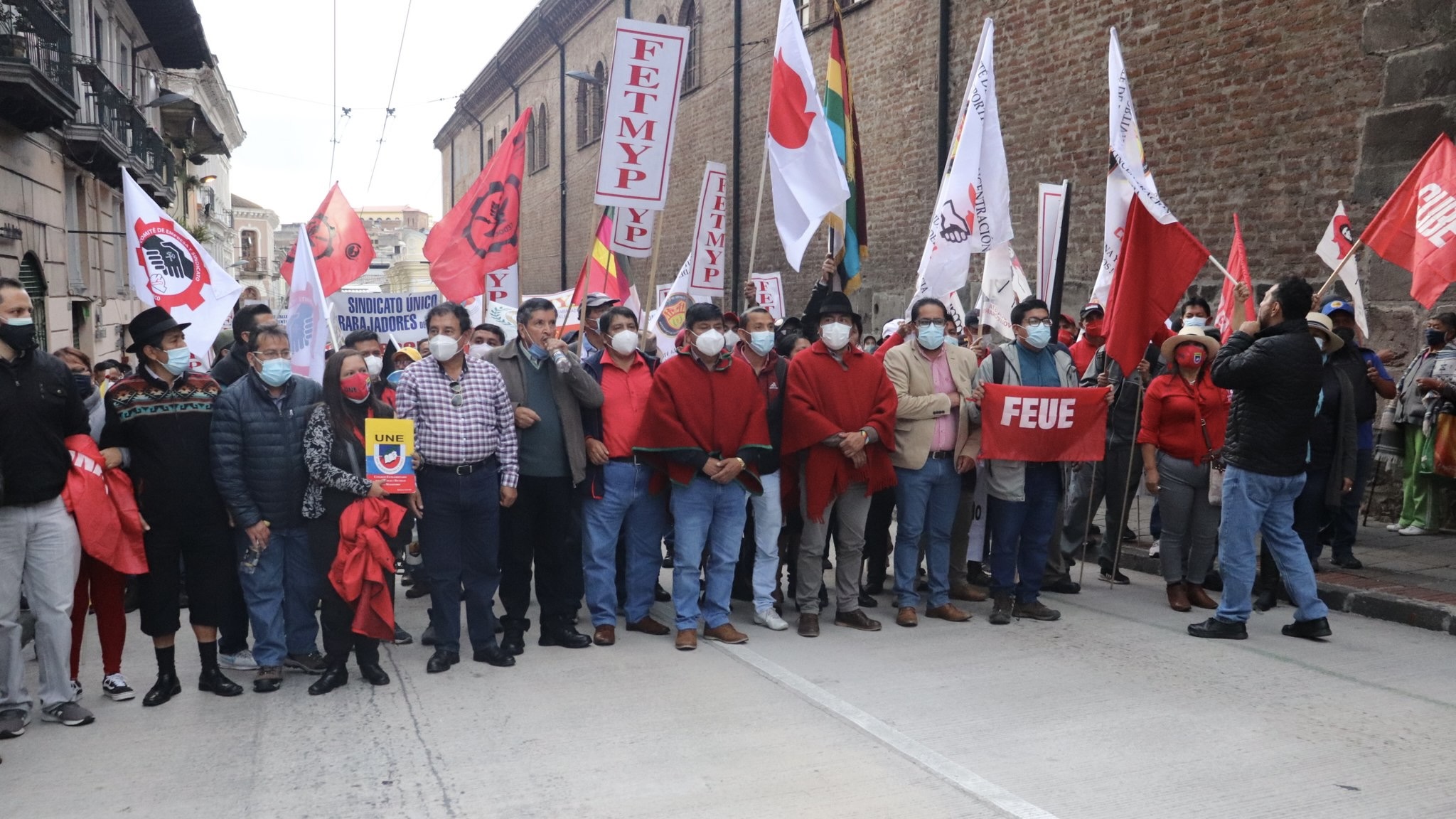Peoples Dispatch
 On September 15, thousands of Ecuadorians took to the streets in different provinces of the country against the neoliberal policies of the right-wing government of President Guillermo Lasso. Photo: CONAIE/Twitter
On September 15, thousands of Ecuadorians took to the streets in different provinces of the country against the neoliberal policies of the right-wing government of President Guillermo Lasso. Photo: CONAIE/Twitter
The primary demands of the trade unions and social organizations include the immediate discontinuation of the neoliberal measure in force since last year, which increases the price of petrol and diesel on a monthly basis, and the cessation of privatization of strategic resources and sectors
On September 15, under the banner of “For rights, employment, education, health, social security and land,” thousands of Ecuadorian workers, teachers, students, peasants, Indigenous communities and members of social movements took to the streets in different provinces of the country. The protesters demanded that the right-wing government of President Guillermo Lasso take measures to address the pressing needs of the citizens.
They demanded that the government immediately discontinue the measure in force since last year, which increases the price of petrol and diesel on a monthly basis. This measure is of primary importance as it affects all and makes basic necessities expensive. They also called for the end of privatization of strategic resources and sectors.
In the capital Quito, the protesters marched from the headquarters of the Ecuadorian Social Security Institute (IESS) to the Santo Domingo Square, holding red and white flags and chanting slogans such as ‘no to privatization of public companies’, ‘united people will never be defeated’, ‘the struggle of the defender of the people is the people’s struggle’, among others. In the cities of Guayaquil, Babahoyo and Santo Domingo peasants and Indigenous people staged sit-ins on major roads and highways and blocked them with stones and burning tires.
#Quito | La marcha de las centrales sindicales llegó a la Plaza de Santo Domingo, en el Centro Histórico. La movilización se desarrolló de manera pacífica y no hubo altercados con la Policía Nacional
Vía: @eltonycash / Video: @patoteran_photo pic.twitter.com/9GHG6VCJ1Z
— El Comercio (@elcomerciocom) September 15, 2021
The mobilizations were called for by the Unitary Front of Workers (FUT) and the Confederation of Indigenous Nationalities of Ecuador (CONAIE). The call received the support from various other social movements and unions such as the Ecuadorian Confederation of Free Trade Union Organizations (CEOSL), the Ecuadorian Confederation of Unitary Class Workers Organizations (CEDOCUT), the General Union of Ecuadorian Workers (UGTE), the Ecuadorian Federation of Municipal and Provincial Workers (FETMYP), the National Union of Educators (UNE), and National Federation of Ecuadorian Provincial Governments Workers (FENOGOPRE), among numerous others.
The trade unions rejected the government plans to present a new labor law bill in the National Assembly, which has not consulted with the organized sectors. The teachers joined the protests to demand a response from the government to their request to analyze the changes to be made to the Organic Law of Intercultural Education (LOEI) as dictated by the Constitutional Court. Various student organizations also joined to demand that the government deliver the necessary resources to universities and boost employment generation programs.
Rice growers in the country took the opportunity to demand fair prices that can allow for farmers to recover their production costs. The banana producers demanded the authorities enforce the Banana Act to prevent international traders from exploiting producers. The peasant communities in general demanded the reopening of the National Storage Unit (UNA), which will guarantee a fair price of the produce and bind the government to purchase the produce from small and medium producers.
The president of CONAIE, Leonidas Iza, while addressing the crowd at the end of the march, recalled that these demands are pending to be addressed for months. In order to pressurize the government, he proposed to hold a new national strike, for which he called for workers, farmers and other sectors to meet and define a date.
In addition to the widespread social discontent, Lasso’s government also suffered governmental setbacks. In less than 4 months since its inauguration, Lasso’s cabinet has experienced several changes.
The same day as the nationwide protests, the Minister of Agriculture and Livestock, Tanlly Vera, resigned from her position amid protests by farmers. Vera’s resignation joined the resignations of Minister of Economic and Social Inclusion Mae Montaño, governor of Guayas Vicente Taiano Álvarez, the president of the Board of Directors of the IESS Jorge Madera.